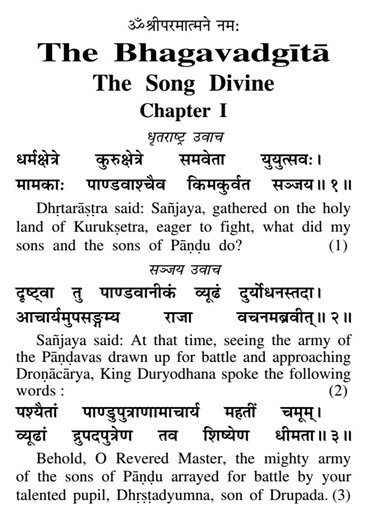The Bhagavadgītā is a conversation between Arjuna and Kṛṣṇa on the battlefield of Kurukṣetra. Sañjaya is narrating the details of the battle to Dhṛtarāṣṭra. As such, the Bhagavadgītā begins with Dhṛtarāṣṭra asking about the war ("dhṛtarāṣṭra uvāca"), and Sañjaya responding, and quoting (chiefly) the words of Arjuna and Kṛṣṇa, who had a conversation at Kurukṣetra. In fact, the entire war is not presented directly in the Mahābhārata, the source of the Bhagavadgītā (beginning with Mahābhārata 6.23), but rather narrated as a "story-within-a-story" between Dhṛtarāṣṭra, who is asking about the details of the war (that's why the Bhagavadgītā begins with Dhṛtarāṣṭra asking about what his sons and the Pāṇḍavas did at Kurukṣetra). Arjuna is grieving and frightened over the prospects of the war; Kṛṣṇa comforts him with spiritual advice that applies as equally to Arjuna as it does today to every human. This spiritual advice is known as the Bhagavadgītā.
The Bhagavadgītā is not changed in any way. The original Sanskrit version was the same version that has always existed. Only the translations vary. The Bhagavadgītā is a conversation on multiple levels (the conversation between Dhṛtarāṣṭra and Sañjaya, with a "sub-conversation" between Kṛṣṇa and Arjuna that is the most important part of the Bhagavadgītā), not a monologue by Kṛṣṇa, and it has not changed.
UPDATE: Upon further examination, I found out that the BORI critical edition of the Mahābhārata does not consider Bhagavadgītā 13.1 (which would be Mahābhārata 6.35.1 if it existed in the critical edition) to be a valid verse. This verse hardly matters, however. It is just Arjuna expressing his desire for knowledge.
